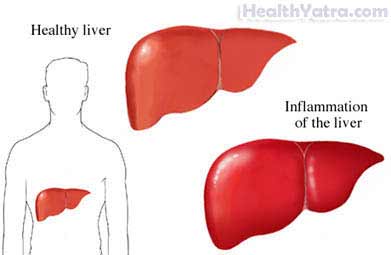সংজ্ঞা
Hepatitis C is an infection of the liver. The hepatitis C virus (HCV) causes it.

কারণসমূহ
The hepatitis C virus is spread through contact with the blood of an infected person.
A woman with hepatitis can pass the virus on to her baby during birth. The hepatitis C virus is not spread through food or water.
ঝুঁকির কারণ
Factors that increase your chance of this infection:
- Injecting illicit drugs, especially with shared needles
- Receiving a blood transfusion before 1992—this risk is very low in the United States.
- Receiving blood clotting products before 1987
- Receiving an HCV-infected organ transplant
- Long-term kidney dialysis treatment
- Sharing toothbrushes, razors, nail clippers, or other personal hygiene items that have HCV-infected blood on them
- Being accidentally stuck by an HCV-infected needle—a concern for healthcare workers
- Frequent contact with HCV-infected people—a concern for healthcare workers
- Tattooing
- Body piercing
- Having sex with partners who have hepatitis C or other sexually transmitted diseases—this is most common in men who have sex with men.
লক্ষণ
Eighty percent of people with hepatitis C have no symptoms. Over time, the disease can cause serious liver damage.
উপসর্গ অন্তর্ভুক্ত হতে পারে:
- ক্লান্তি
- ক্ষুধামান্দ্য
- Jaundice (yellowing of the eyes and skin)
- Darker colored urine
- Loose, light, or chalky colored stools
- পেটে ব্যথা
- Aches and pains
- চুলকানি
- আমবাত
- সংযোগে ব্যথা
- Cigarette smokers may suddenly dislike the taste of cigarettes
- বমি বমি ভাব
- বমি
Chronic hepatitis C may cause some of the above symptoms, as well as:
- দুর্বলতা
- তীব্র ক্লান্তি
- ক্ষুধামান্দ্য
Serious complications of hepatitis C include:
- Chronic infection that will lead to cirrhosis (scarring) and progressive liver failure
- Increased risk of liver cancer
রোগ নির্ণয়
Your doctor will ask about your symptoms and medical history. A physical exam will be done. You will also discuss your risk factors.
পরীক্ষা অন্তর্ভুক্ত হতে পারে:
- Blood tests—to look for hepatitis C antibodies or genetic material from the virus (antibodies are proteins that your body has made to fight the hepatitis C virus)
- Liver function studies— to initially determine and follow how well your liver is functioning
- Ultrasound of the liver—to assess liver damage
- Liver biopsy —removal of a sample of liver tissue to be examined
চিকিৎসা
Hepatitis C is usually treated with combined therapy, consisting of:
- Interferon—given by injection
- Ribavirin —given orally
- Protease inhibitor
These medicines can cause difficult side effects. They also have limited success rates.
In unsuccessful cases, chronic hepatitis C can cause cirrhosis and serious liver damage. A liver transplant may be needed, although it does not typically cure hepatitis C.
If you are diagnosed with hepatitis C, follow your doctor’s instructions .
প্রতিরোধ
To prevent becoming infected with hepatitis C:
- Do not inject illicit drugs. Shared needles have the highest risk. Seek help to stop using drugs.
- Do not have sex with partners who have sexually transmitted diseases (STDs).
- Practice safe sex (using latex condoms) or abstain from sex.
- Limit your number of sexual partners.
- Do not share personal items that might have blood on them, such as:
- Razors
- Toothbrushes
- Manicuring tools
- Pierced earrings
- Avoid handling items that may be contaminated by HCV-infected blood.
- Donate your own blood before elective surgery to be used if you need a blood transfusion.
To prevent spreading hepatitis C to others if you are infected:
- Tell your dentist and physician before receiving check-ups or treatment.
- Get both a hepatitis A and hepatitis B vaccination.
- Do not donate blood or organs for transplant.
